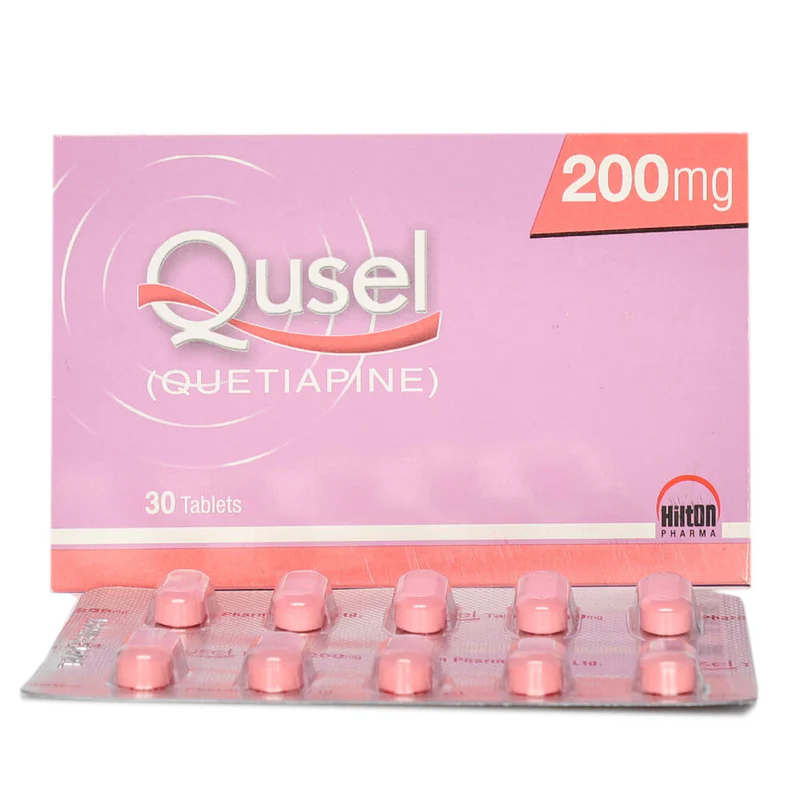QUSEL (Quetiapine) Tablets are oral atypical antipsychotic medications designed to treat and manage various psychiatric disorders. Quetiapine works by modulating the activity of certain neurotransmitters, particularly serotonin and dopamine, in the brain to improve mood, reduce psychotic symptoms, and stabilize behavior. QUSEL is commonly prescribed for conditions such as schizophrenia, bipolar disorder, and major depressive disorder. It is available in three dosage strengths—25 mg, 100 mg, and 200 mg—offering flexibility in dosing for tailored treatment based on the patient’s condition and response.
Key Features and Benefits:
- Antipsychotic Action: Quetiapine helps control symptoms of psychotic disorders by regulating neurotransmitter activity in the brain, reducing hallucinations, delusions, and disorganized thinking.
- Mood Stabilization: Quetiapine is effective in stabilizing mood swings in individuals with bipolar disorder, preventing both manic and depressive episodes.
- Adjunct Therapy for Depression: QUSEL can be used as an adjunctive treatment in major depressive disorder (MDD) when patients do not respond adequately to antidepressants alone.
- Versatile Dosing Options: Available in 25 mg, 100 mg, and 200 mg tablets, allowing for flexible dose adjustments based on patient needs and treatment goals.
- Improves Daily Functioning: By reducing symptoms of mental illness, QUSEL enhances the ability to function in daily life, improving overall well-being.
- Minimal Sedation: Compared to other antipsychotics, Quetiapine may have fewer sedative effects, allowing patients to remain active and alert during daily activities.
Usage Instructions:
- Dosage:
- Schizophrenia:
- Adults: Typically, the starting dose is 25 mg twice daily, gradually increased to a target dose of 300-800 mg per day, depending on the individual response.
- Bipolar Disorder:
- Manic Episodes: Starting dose is 100 mg/day, increasing to 400-600 mg/day as tolerated.
- Depressive Episodes: Initial dose of 50 mg/day, which may be increased to 300 mg/day based on response.
- Major Depressive Disorder (Adjunct Therapy):
- Adults: 150-300 mg/day, in combination with other antidepressants, depending on individual needs.
- Schizophrenia:
- Administration:
- Take QUSEL tablets orally with or without food.
- Swallow the tablet whole with water. Do not crush or chew the tablet.
- Frequency:
- Once or Twice Daily: Depending on the condition being treated, QUSEL is typically taken once or twice daily, as directed by your healthcare provider.
- Take the medication at the same time each day to maintain consistent levels in your system for optimal effectiveness.
- Duration of Treatment:
- Long-Term Therapy: QUSEL is generally prescribed for long-term use to manage psychiatric conditions. Do not stop taking the medication without consulting your healthcare provider, even if symptoms improve.
- Missed Dose:
- If you miss a dose, take it as soon as you remember.
- If it is near the time for your next dose, skip the missed dose and resume your regular schedule.
- Do not double the dose to make up for a missed one.
Precautions:
- Consult a Healthcare Provider: Always use QUSEL under the supervision of a qualified healthcare professional to ensure appropriate treatment and minimize risks.
- Medical History: Inform your healthcare provider if you have a history of cardiovascular disease, liver or kidney issues, diabetes, seizures, or any other significant medical conditions, as dosage adjustments may be necessary.
- Blood Glucose Monitoring: Quetiapine can raise blood sugar levels, particularly in people with diabetes. Regular monitoring of blood sugar levels may be required.
- Suicidal Thoughts: Antidepressants, including Quetiapine, may increase the risk of suicidal thoughts, especially in younger patients. Any changes in mood, behavior, or thoughts of self-harm should be reported immediately.
- Orthostatic Hypotension: Quetiapine may cause a drop in blood pressure when standing up quickly. To reduce this risk, get up slowly from sitting or lying down.
- Pregnancy and Breastfeeding: Consult your healthcare provider before using QUSEL if you are pregnant, planning to become pregnant, or breastfeeding. Quetiapine should only be used during pregnancy if the potential benefits outweigh the risks.
- Avoid Alcohol: Limit or avoid alcohol consumption while taking QUSEL as it can enhance the sedative effects of the medication and increase the risk of side effects.
Possible Side Effects:
- Common Side Effects:
- Drowsiness or sedation
- Dizziness or lightheadedness
- Dry mouth
- Constipation
- Weight gain
- Fatigue
- Less Common Side Effects:
- Blurred vision
- Headache
- Insomnia
- Increased appetite
- Elevated cholesterol or blood sugar levels
- Serious Side Effects (Seek Medical Attention Immediately):
- Signs of an allergic reaction, such as rash, itching, swelling, severe dizziness, or difficulty breathing
- Uncontrolled seizures
- Irregular heartbeat or palpitations
- Severe hypotension (low blood pressure)
- Symptoms of neuroleptic malignant syndrome, such as high fever, muscle rigidity, confusion, and changes in blood pressure
- Symptoms of liver problems, such as yellowing of the skin or eyes (jaundice), dark urine, or persistent nausea and vomiting
Storage Instructions:
- Temperature: Store QUSEL tablets at room temperature, between 15°C to 30°C (59°F to 86°F), away from direct sunlight and moisture to maintain efficacy.
- Accessibility: Keep the medication out of reach of children to prevent accidental ingestion.
- Packaging Integrity: Ensure that the bottle is tightly sealed after each use to protect the tablets from environmental factors and maintain their shelf life.
- Expiration: Do not use the tablets beyond the expiration date indicated on the packaging. Discard any unused medication after this date.


